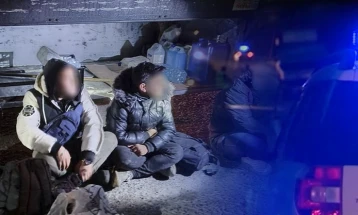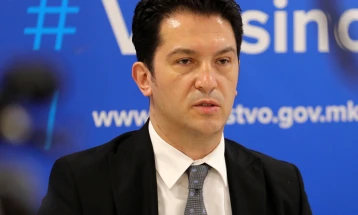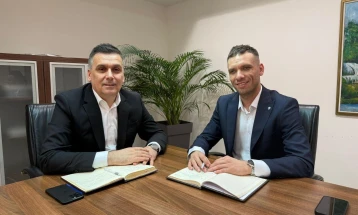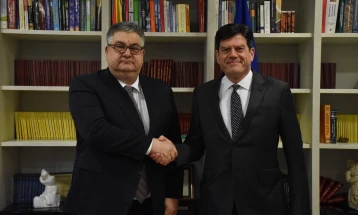Petrovska: Peaceful, secure Balkans possible only if integrated
- eaceful, secure Balkans are possible only if the region is integrated, given that our integration processes have shown to also be processes of reconciliation, Defense Minister Slavjanka Petrovska told the SMART Balkans Regional Conference 2023 on the topic of "Peace and Prosperity in the Western Balkans."
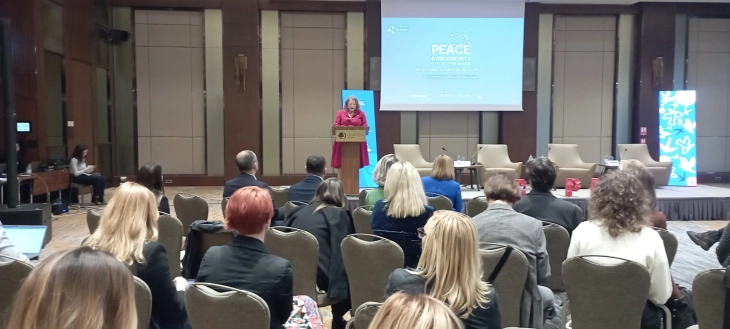
Skopje, 14 December 2023 (МIA) — Peaceful, secure Balkans are possible only if the region is integrated, given that our integration processes have shown to also be processes of reconciliation, Defense Minister Slavjanka Petrovska told the SMART Balkans Regional Conference 2023 on the topic of "Peace and Prosperity in the Western Balkans."
In her remarks, Defense Minister Petrovska pointed out that the European Union was the best example for guaranteeing peace between countries. She added that North Macedonia was continuously working toward its goal of joining the bloc.
"We are paving the road to the EU," Petrovska said. "North Macedonia and Macedonian citizens deserve to be part of the great European family, a family of values and ideals."
"Along the way, many obligations remain," she said, expressing her hope that politicians would rise to the task of adopting the constitutional amendments needed to continue the accession process. "I hope that all democratic, progressive forces that mean this country well will take this step in the right direction," Petrovska said.
Speaking about modern security threats and cyber attacks, she said the state was allocating significant funding for protection and was thankful for the support of other countries.
She added North Macedonia would also be able to contribute to regional security when it joined the EU "but that requires political, courageous and visionary decisions," she added.
According to Petrovska, the Ministry of Defense had not logged any recent cyber attacks that would distrupt the work of the country's institutions.
"This is is due to our continuous capacity-building and the right infrastructure that provides early warnings of any such attacks," she said.
Regarding the war in the Gaza Strip and any potential security threat to the country, Petrovska said there were no conventional threats. She added that people who had left Gaza to come back to North Macedonia were being helped to reintegrate into society.
"This is one issue we are following really closely," the defense minister said. "There is no conventional type of threat. But of course we can never be sure as long as anywhere in the world — especially where, let's say, we have some ties — there is any kind of conflict."
"However," she added, "this process is very complex.
"Whenever we face either potential or real threats, in addition to the institutions that should respond first [...] we also need to include the civil sector and the public."
Center for Research and Policy Making head Marija Ristevska said the region was in an exceptional geopolitically polarized moment and civil society organizations could play a key role in building resilience and promoting peace.
"Because of this, we are very glad to be signing today 20 grant agreements with regional organizations that will work on the topics of security, stability, good governmance, fight against corruption, gender equality, and environmental protection. All of them are connected and affect the stability of the Balkans," Ristevska said.
She added that research findings showed that organized crime, corruption and polarized relations between ethnic communities were the main threats to peace in the Balkans.
Kristin Melsom, Ambassador Of Norway To Serbia, Montenegro and North Macedonia, and Dajana Cvjetković, SMART Balkans Program Manager at the Center for Civil Society Promotion were also set to address the conference.
The two-day conference is organized as part of the SMART Balkans - Civil Society for Shared Society in the Western Balkans project.
The project is implemented by the Center for Civil Society Promotion from Bosnia and Herzegovina together with the partner organizations Institute for Democracy and Mediation from Albania, and the Center for Research and Policy Making from North Macedonia.
Financed by the Norwegian Ministry of Foreign Affairs with a grant worth more than 17 million euros, the SMART Balkans project is meant to contribute to strengthening participatory democracies and Euro-Atlantic integrations in the Western Balkans by empowering civil society organizations and CSO networks for stronger and active role in creating peaceful and inclusive societies for sustainable development in Albania, Bosnia and Herzegovina, Kosovo, Montenegro, Serbia, and North Macedonia. mr/
Фото: МИА


